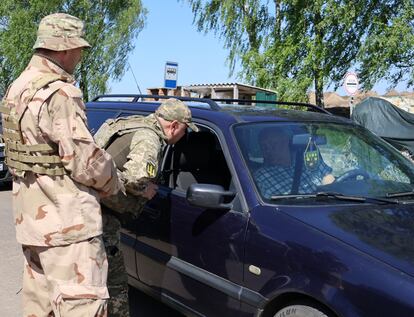A day with a military recruitment patrol, the most unpopular job in Ukraine
EL PAÍS accompanies a unit of former front line soldiers now tasked with enlisting civilians in the province of Sumi

“We faced a large-scale invasion, and now we face large-scale social rejection of the army,” Major Oleksander Bondarenko, press officer of the military command in Sumi province, northern Ukraine, tells EL PAÍS. On May 3, this newspaper accompanied a patrol of the Sumi Regional Recruitment Office (TCC), which is in charge of signing up new soldiers. Citizens, both men and women, aimed distrustful looks at the soldiers who identified them in villages and on the road. One of the restrictions laid out by Bondarenko for this article was that no photographs should be taken in the event of a conflict with a civilian.
Kyiv urgently needs more troops. Tens of thousands of casualties and an exhausted army after over two years of war against Russia have decimated the Armed Forces of Ukraine. A new mobilization law, passed in April after months of delays due to its unpopularity, will come into force on May 18. The aim is to recruit some 400,000 new soldiers between the ages of 25 and 60. On the streets, military personnel looking for men willing to go to the front lines are experiencing first-hand the reluctance of citizens to be mobilized. Surveys indicate that only about 30% of the population are willing to join in the defense of the country.
“I am obsessed with knowing when this widespread rejection of the army began,” says Bondarenko at a point 25 kilometers (15.5 miles) from the Russian border, where the invading forces are threatening a fresh offensive that would open up a new front line. Yulia Vitkovska is an officer with the Sumi TCC. Vitskovska, like the rest of the soldiers in the unit, only returned from the combat zone a few months ago. Most are suffering from physical or mental injuries and are unable to continue fighting. She served in the 58th Mechanized Brigade in some of the bloodiest battles of the war, such as the defense of Bakhmut or at Vuhledar. “People always have some excuse to duck out,” Vitkovska says. Her comrades, civilians before the war like her, received the call to enlist in 2022. Captain Igor, the highest-ranking officer in the group, concurs that by the end of 2023 (after the failed counteroffensive in the summer of that year), the number of people willing to join the Armed Forces began to dwindle.
There are few cases in which the identified person refuses to present their documents, the TCC members explain. They are accompanied by a police patrol, which has the legal authority to intervene if a civilian refuses to cooperate. Vitkovska recalls the case of a 30-year-old man, on the second patrol she conducted, at a roadblock four months ago. “That guy was strong, healthy, and refused to identify himself, he didn’t care. I asked him what he would do if the Russians besieged Sumi again, who would defend his house and his wife. In that case, he replied, yes he would enlist.”
Oleksi is 29 years old and a cab driver in Sumi. He is exempt from being called up because he has a document certifying that his mother is ill and he is the primary caregiver. But even if that were not the case, he admits, he would not want to join the army. “I don’t want to go because I don’t want to die. I would volunteer if my city was at risk of being occupied, but for the moment, of my friends who are fighting, the only ones who have returned have done so crippled or in a coffin.”
The TCC sets up a roadblock near the municipality of Stepanivka. In the surrounding fields, bulldozers and workers are battling against the clock to erect new fortifications to protect the provincial capital from a possible new Russian assault from the north. The drivers stopped by Igor show their identity cards and official papers exempting them from being recruited, for reasons of health, family — as in the case of Oleksi — study, or work. The new law will limit the number of cases by which a person can avoid enlistment. “We have come across men aged over 40 who started studying at university — when the war is over, we will be the most educated country in the world,” Igor comments wryly.
Roadblocks are the most effective way to find men to be summoned to report to the recruiting office, Vitkovska says. “On a normal day, on average, we can deliver 15 summonses, but when we do large operations, when we cut several roads and there is no way to bypass the roadblocks, we can reach 50″, Igor adds.
In the villages there are two procedures for distributing call-up notices: patrolling the streets or showing up at homes where men of fighting age are registered. “Visiting homes is not the most effective method, because out of every 10 houses you go to, only two open the door,” Vitkovska calculates. On the streets of Stepanivka, the TCC operation is not going as well as hoped either. “The population finds out about our location through (social network) Telegram groups and the men disappear,” Igor confirms. In the center of Stepanivka is a grocery store, a bar, the post office, the pharmacy, and the town hall. It is an area that, under normal conditions, would be frequented by locals, but in the hour the patrol spends there it is deserted, like a town in a western movie when a group of armed outsiders rides in.
A van appears and six men get out. The TCC patrol, together with the police, immediately accosts them. They are all carrying a temporary work permit for a public construction site where they are working. Soon, another van pulls up and a man gets out to pick up some packages from the post office. The soldiers give him a summons to report to the recruiting office; he explains that this is not the first one he has received. Under the new mobilization law, ignoring these summonses will mean higher fines, with the risk of having your accounts frozen as well as losing your driver’s license.
A quarter of Stepanivka’s fighting-age men have already enlisted, reports the City Hall. This is a high percentage and confirms Vitkovska’s experience: mobilization is more effective in rural areas. “People in the city are more educated and have more ways to wriggle out of it,” adds Igor, the captain. A common ploy to avoid conscription — residing in one region while being registered in another — is rare in the villages. In the face of this maneuver, Vitkovska concludes, the TCC patrols can do little: if they ask for documents from someone who is registered as living in a province other than Sumi, they have no authority to force them to serve their country.
Sign up for our weekly newsletter to get more English-language news coverage from EL PAÍS USA Edition
Tu suscripción se está usando en otro dispositivo
¿Quieres añadir otro usuario a tu suscripción?
Si continúas leyendo en este dispositivo, no se podrá leer en el otro.
FlechaTu suscripción se está usando en otro dispositivo y solo puedes acceder a EL PAÍS desde un dispositivo a la vez.
Si quieres compartir tu cuenta, cambia tu suscripción a la modalidad Premium, así podrás añadir otro usuario. Cada uno accederá con su propia cuenta de email, lo que os permitirá personalizar vuestra experiencia en EL PAÍS.
¿Tienes una suscripción de empresa? Accede aquí para contratar más cuentas.
En el caso de no saber quién está usando tu cuenta, te recomendamos cambiar tu contraseña aquí.
Si decides continuar compartiendo tu cuenta, este mensaje se mostrará en tu dispositivo y en el de la otra persona que está usando tu cuenta de forma indefinida, afectando a tu experiencia de lectura. Puedes consultar aquí los términos y condiciones de la suscripción digital.









































